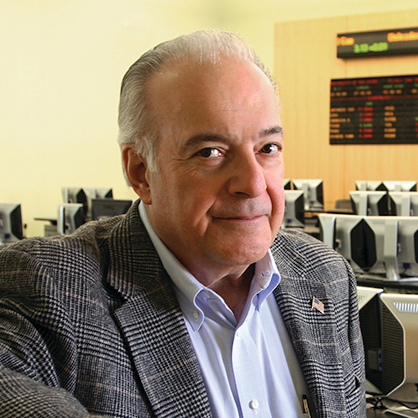
University News
Passing of Devoted University Benefactor Sam Bergami Jr. ’85 EMBA, ’02 Hon.
President Jens Frederiksen, Ph.D. shared the sad news that one of the University’s most devoted benefactors passed away late last week.
The Charger Blog
In the year and a half since its opening, the University’s Bergami Center for Science, Technology, and Innovation is having a significant impact on students’ educational experience and is creating new ways for Chargers to collaborate and create.
February 10, 2022
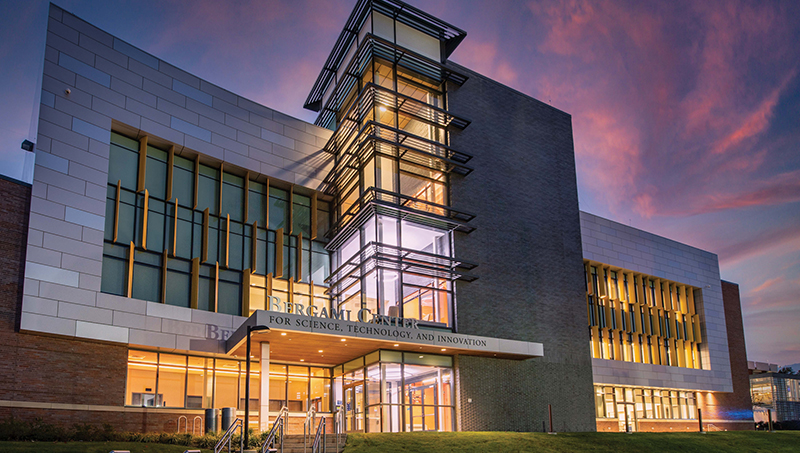
For Louis Annino ’99 EMBA, one of the things he finds particularly inspiring about the University’s Bergami Center for Science, Technology, and Innovation is how it is bringing members of the University community together. An engineer, who describes himself as a “linear thinker,” is excited that it is creating so many opportunities for students from across all majors to connect, while also enhancing the way they get around campus.
When the building was still in the design phase, Annino and the architects studied pedestrian flow, and they hoped to encourage Chargers to travel through the Bergami Center as they made their way around campus. They hoped it would become a hub where students could gather to study, collaborate, and socialize, serving as a “center of activity” on campus. Annino says that goal has been accomplished – and then some.
“It has certainly exceeded my wildest expectations,” said Annino, associate vice president and chief facilities officer for the University. “I go there, and I watch how the students travel through the facility, and they stop and get a cup of coffee along the way. They see their friends from different disciplines. Even in the off hours, students gather in the atrium area in the soft seating for group studying. Those were certainly design attributes we wanted to be sure we infused into the facility, and, from where I sit, it certainly appears that has happened.”
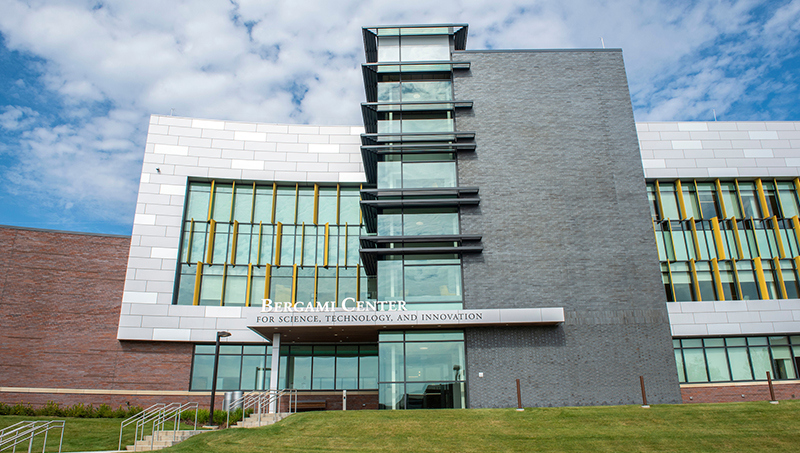
Annino acknowledges that the Bergami Center, which offers more than 45,000 square feet of learning and collaborative space, was a complicated project. Not only was the building itself new, but it was incorporated into an existing building – Buckman Hall – and architects had to coordinate features of both so that they married seamlessly, inside and out. One way they achieved this is by creating an energy building to the south that provides additional air conditioning, ventilation, electric power, and heating.
Further complicating the construction, the University was also managing the simultaneous work taking place at Dodds Hall, including the renovation of biology and forensic science space and creating a more modern art and design space.
“It took a lot of coordination, compromise, understanding from all parties to make it happen,” he explains. “But, looking at the Bergami Center today, I believe we created a quality facility for the University community to enjoy.”
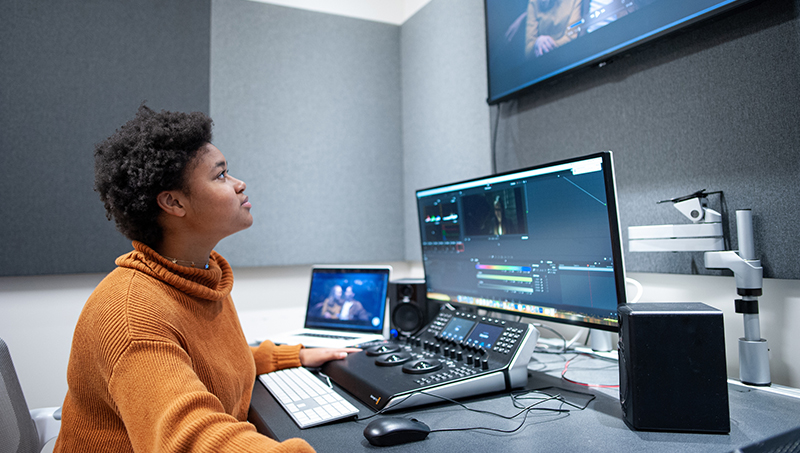
The building, which officially opened in advance of the start of the Fall 2020 semester as part of the University’s yearlong Centennial Celebration, includes approximately 15,000 square feet of new art and science space – something that the designers believed was critical. Designed to cultivate innovation and creativity, the Bergami Center also features cutting-edge collaborative classrooms, engineering and science labs, video production studios, a makerspace, and an esports training and competition space.
“The Bergami Center has opened up cross-disciplinary opportunities, not only for communication students, but for students from all programs,” said Tom Garrett, M.F.A., chair of the University’s Communication, Film, and Media Studies Department. “This includes students in fields such as music, music and sound recording, art, and design. They all have opportunities to cross collaborate in shared spaces that give them the room and latest technologies in equipment, complementing all students.”
Named in recognition of longtime University benefactors Samuel Bergami Jr. '85 EMBA, ’02 Hon., and Lois Bergami, the $35 million Bergami Center was also supported by donations from alumni, staff, and faculty members from across the University community.
“The ‘Berg Center,’ as it has been affectionately nicknamed by our students, has become a major hub of student activity on our campus,” said Mario Gaboury, J.D., Ph.D., dean of the University’s Lee College who served as interim provost when the building opened and during its construction. “With its beautiful and stylish design, open floor plan common-areas, and leading-edge instructional technology throughout, it has become a prime learning location.
“In discussing this with Sam Bergami and several Bergami Summer Internship students last fall, Sam smiled and disclosed that his college nickname was ‘Berg,’” Dr. Gaboury continued. “We all felt this added to a fitting legacy to Sam and Lois for all they have done over the years.”
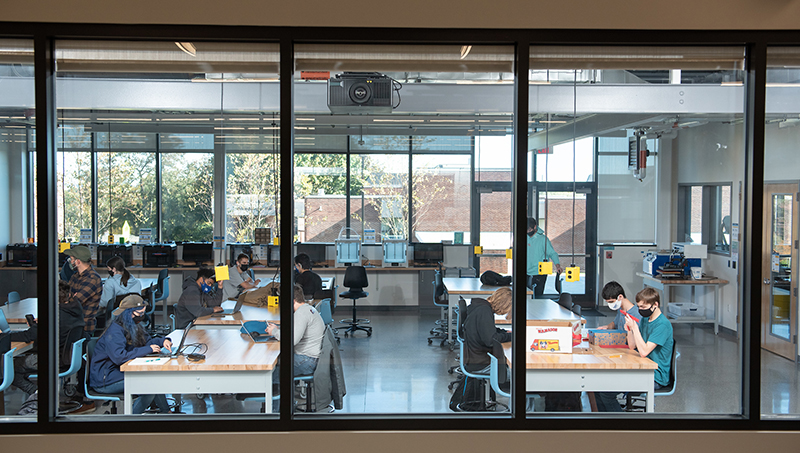
Designed by Svigals + Partners, an award-winning architecture firm based in New Haven, “The Berg” has already been recognized with several design awards, including the 2021 AIA Design Merit Award, an ENR New England Award of Merit, and a 2021 Connecticut Building Congress Project Team Award.
The Bergami Center has also been lauded as a “green” learning space, earning a Leadership in Energy and Environmental Design (LEED) Gold Certification from the U.S. Green Building Council. Not only does it feature energy-saving operating modes such as advanced and low- energy lighting and light harvesting, its construction includes myriad sustainable and recycled materials.
The designers also plan to continue to enhance the building’s sustainability in the future. During construction, they added the backbone for a possible future installation of photovoltaics, the conversion of light into electricity using semiconducting materials. By also aggregating the power that feeds the Bergami Center and Buckman Hall, Annino says they were able to create a “hub of power,” and they’re in the process of putting in a fuel cell to provide sustainable electric power. He expects that to yield approximately $100,000 in energy savings each year.
“Sustainability was infused into the design of the building from the very beginning,” said Annino. “We wanted to make sure the building was state-of-the-art from an energy and sustainability perspective. Those plans would not have been possible if we hadn’t planned for that in the design of the Bergami Center.”
Annino, a proud graduate of the University’s Executive MBA program, is looking forward to the impact the building promises to continue to have on campus. Because of the pandemic, he says the University has not yet been able to host a large event in the building, and he looks forward to when more members of the University and local communities get to see it.
“We have only just begun to tap the value of the building,” he said. “It’s only now that we’re generating that ground swell of interest. I’d love to hear feedback from students and faculty.”

University News
President Jens Frederiksen, Ph.D. shared the sad news that one of the University’s most devoted benefactors passed away late last week.

University News
The University of New Haven took a leadership role in bringing together a group including 16 academic institutions and six community organizations and nonprofit agencies that will collaborate with the goal of establishing Connecticut as a premier hub for artificial intelligence, innovation, and application.

The Charger Blog
Music and Sound Recording major Mattingly Creter ’27 sat down with Professor Goodfellow to talk about his recent tour, latest album, and the evolution of his music.